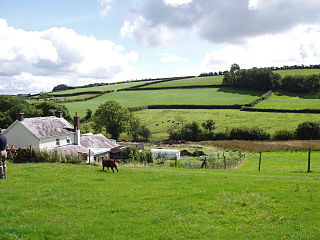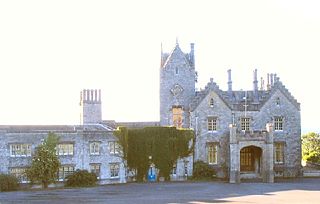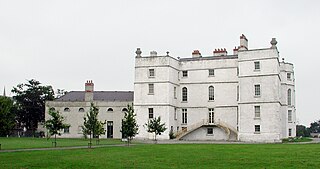Related Research Articles

Earl Cawdor, of Castlemartin in the County of Pembroke, is a title in the Peerage of the United Kingdom. It was created in 1827 for the politician John Campbell, 2nd Baron Cawdor.
Sir William Vaughan was a Welsh writer in English and Latin. He promoted colonization in Newfoundland, but with mixed success.

John Vaughan, 3rd Earl of Carbery KB, FRS, styled Lord Vaughan from 1643 to 1686, was a Welsh nobleman and colonial administrator who served as the governor of Jamaica between 1675 and 1678.

Earl of Carbery, in the County of Cork, was a title in the Peerage of Ireland. It was created on 5 August 1628 for the Welsh courtier and politician John Vaughan, 1st Baron Vaughan. He had already been created Baron Vaughan, of Mullingar in the County of Westmeath, on 13 July 1621, also in the Peerage of Ireland. He was succeeded by his son, Richard, the second Earl. He fought as a Royalist in the English Civil War. On 25 October 1643 Charles I created him Baron Vaughan, of Emlyn in the County of Carmarthen, in the Peerage of England, which entitled him to a seat in the English House of Lords. His eldest son Francis Vaughan, Lord Vaughan sat as Member of Parliament for Carmarthen but predeceased his father. Lord Carbery was therefore succeeded by his second son, John, the third Earl. He notably served as Governor of Jamaica between 1675 and 1678 and as President of the Royal Society between 1686 and 1689. He had no surviving male issue and the titles became extinct on his death in 1713.

Richard Vaughan, 2nd Earl of Carbery KB, PC, styled The Honourable from 1621 to 1628 and then Lord Vaughan until 1634, was a Welsh soldier, peer and politician.

Arthur Chichester, 1st Baron Chichester, of Carrickfergus in Ireland, was an English administrator and soldier who served as Lord Deputy of Ireland from 1605 to 1616. He was instrumental in the development and expansion of Belfast, now Northern Ireland's capital. Several streets are named in honour of himself and his nephew and heir Arthur Chichester, 1st Earl of Donegall, including Chichester Street and the adjoining Donegall Place, site of the Belfast City Hall.

Llanfihangel Aberbythych is a community in Carmarthenshire, Wales. The population recorded at the 2011 census was 1,344. It is bordered by Llangathen, Llandeilo, Dyffryn Cennen, Llandybie, Gorslas and Llanarthney, all of which are in Carmarthenshire. There is no village of Llanfihangel Aberbythych – the name is taken from St Michael's Church, which dates from 1849, at Golden Grove, about 3 miles (5 km) south-west of Llandeilo. It now belongs to the Church in Wales parish of Catheiniog. Villages include Carmel and Maesybont.
John Vaughan, 1st Earl of Carbery was a Welsh courtier and politician who sat in the House of Commons in 1601 and from 1621 to 1622. He served Robert Devereux, 2nd Earl of Essex, and later Prince Charles, heir to the throne of King James I. However, his career ended when the Prince acceded to the throne in 1625, and he later estimated that serving the Prince had cost him £20,000, which went unrecompensed.
John Vaughan may refer to:
Sir Henry Vaughan the elder was a Welsh politician who sat in the House of Commons variously between 1621 and 1644. He was a Royalist leader during the English Civil War.

Gelli Aur is a country park in Carmarthenshire, Wales, with 60 acres (240,000 m2) of wooded parkland surrounding Golden Grove mansion. It was once the home of the Vaughan and Cawdor families. The park featured a number of nature trails, a 20-acre (81,000 m2) deer park, a 10-acre (40,000 m2) Aboretum planted in the 1860s. The park was managed for many years by Carmarthenshire County Council. The park is registered at Grade II* on the Cadw/ICOMOS Register of Parks and Gardens of Special Historic Interest in Wales.

Golden Grove is a mansion and estate in the Welsh county of Carmarthenshire, located 4 miles (6 km) southwest of Llandeilo.
Sir Walter Rice was a Welsh politician who sat in the House of Commons at various times between 1584 and 1611.
John Vaughan was a Welsh politician.

Sir Adam Loftus was an Irish politician and public official of the seventeenth century.
John Vaughan was a Welsh landowner and politician who sat in the House of Commons from 1779 to 1784.

Frances Vaughan, Countess of Carbery was the second wife of Richard Vaughan, 2nd Earl of Carbery. Her second son, John, became the 3rd Earl following his father's death in 1686.

Sir Thomas Stepney, 5th Baronet was a Welsh landowner and politician who sat in the House of Commons from 1717 to 1722.
Arthur Bevan, of Laugharne, Carmarthenshire, was a Welsh lawyer and Whig politician who sat in the House of Commons from 1727 to 1741.
The Mayor, Burgesses, and Commonalty of the Borough of Carmarthen were established by a royal charter of 1604. The Mayorship was transferred in 1835 to Carmarthen Borough Council, and following local government reorganization in 1974 to Carmarthen Town Council.
References
- ↑ "VAUGHAN, Walter (d.1598), of Golden Grove, Carm. | History of Parliament Online". www.historyofparliamentonline.org.